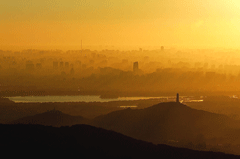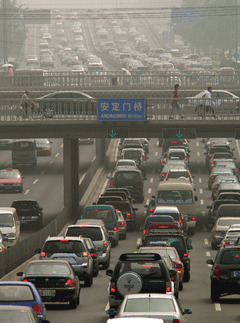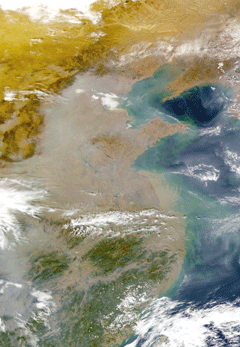Beijing's Challenge
Air Date: Week of November 23, 2007

Sunrise through the smog in Beijing. (Photo: Flickr/Luo Shaoyang)
With the Olympics a year away, Beijing is trying to clean its air. China's capital is adding new subway lines, and cutting bus fares in hopes that residents will take public transportation. But, with 1,000 new cars on the road every day, Beijing is up against a big challenge. Radio Deutsche Welle's Elise Potaka reports.
Transcript
CURWOOD: From the Jennifer and Ted Stanley Studios in Somerville, Massachusetts—this is Living on Earth. I’m Steve Curwood. With the 2008 Olympics coming up in Beijing, there’s a lot of talk about air quality and traffic in the capital of China. One thousand new cars go on the road in Beijing every day, joining the three to four million cars that are already jamming the streets and threatening public health. Breath the air in Beijing and you're breathing the world’s highest levels of lung-damaging nitrous oxide, according to a recent study. As well las a lot of particulates.
So China is facing a big challenge: how to move people without choking them.
Radio Deutsche Welle’s Elise Potaka has our report from Beijing.
[SOUND OF BUSY STREET, HONKING, VEHICLES DRIVING]
POTAKA: A normal day on Beijing’s roads involves a lot of patience, as cars crawl along at a snail pace and the smog over the city deepens. With the Olympics less than a year away and government pledges to fix air quality and reduce China’s greenhouse impact, Beijing is working overtime to try and resolve its transport problems.

Traffic is often at a standstill in Beijing.
(Photo: Flickr/hldpn)
POTAKA: This month, the government opened its fifth subway line, cutting through the center of the city and heading out to the suburbs. There are another six lines in various stages of planning and construction. The government has also this year dramatically reduced the price of bus and subway tickets in efforts to encourage more public transport use.
[WOMAN SPEAKING IN CHINESE]
POTAKA: Outside Jangleman (SP?) subway station, this woman tells me that Beijing simply has too many people, and now, too many cars. She says that having cheaper subway tickets is a good idea, but the trains have become too crowded; it’s not safe.
[SOUND OF BUS PASSING]
POTAKA: The same goes for buses, where sometimes it seems you’d be better off walking to your destination. One big problem is the amount of tax, which the car industry injects into local GDP, making the central government unwilling to put limits on car consumption, says Lu Di Xong (SP?). He’s the senior engineer with the China Sustainable Transport Center.
XONG THROUGH INTERPRETER: The government needs to choose between economics and the environment and sustainable development. The money from the car industry can support the city’s development for only a short time, but sustainable means we need to look ahead 10, 20 years. You need to put money back in the environment, clean up air pollution, and pay the true cost of energy to be sustainable.

This SeaWiFS image of eastern China shows the extent of the country's pollution. Beijing has completely disappeared under the haze. (Photo: SeaWiFS Project, NASA/Goddard Space Flight Center, and ORBIMAGE)
POTAKA: Beijing was once famous as a great biking city. And this environmentally-friendly form of transport is often still the quickest way to get from A to B because of the city’s narrow lane ways and the wide bike lanes. But as Hu Wei Ju (SP?) from China’s Friends of Nature says, biking around Beijing is becoming less and less convenient.
JU: We have a regulation for the bike lane, but as far as I see, many bike lanes do not meet the regulation, and some of the bike lanes most of the time will be occupied by cars because we have too many cars.
POTAKA: Many Beijing bike riders take the city’s narrow alleyways, known as ‘hutongs,’ to try to avoid cars and pollution. But Beijing has implemented a new regulation, which is sending more cars into the backstreets in an attempt to free up some of the city’s main roads. Hu Whey Jo:
JU: The last year since—the last year in September, the transport traffic administration office in Beijing. They set up a new policy to encourage taxi drivers to use the small alleys and the narrow streets in Beijing, so—
POTAKA: You mean they are encouraging taxi drivers to get off the big roads like the 2nd Ring Road and take the narrow back streets—

Sunrise through the smog in Beijing. (Photo: Flickr/Luo Shaoyang)
[CARS DRIVING AND BICYCLE BELLS, MAN SPEAKING IN CHINESE]
POTAKA: This Beijing local tells me one problem with bike riding these days is that more and more people are living on the city’s outskirts, far away from their offices in the city’s center. Engineer Lu Di Xong agrees that urban planning, which factors in good public transport, is another big challenge.
XONG THROUGH INTERPRETER: A distance of more than nine miles isn’t suitable for a bicycle. So when people live far from the center of the city, they can’t ride their bicycles to work because the distance is too long. Our urban planners must plan good satellite towns, where people can live and work.
[CARS DRIVING]
POTAKA: At the same time, those working in the area of sustainable transport are realizing that trying to stop people from buying cars in China is not an easy task at the moment. Hu Wei Ju from Friends of Nature:
JU: People use a kind of standard to evaluate personal success with cars. So if you are reaching up or have a successful career, you should have a car, something like that. And maybe some people, they have worked for several years to have a car and it’s quite difficult to convince them to give up cars.
POTAKA: On a positive note, local governments around China have begun investing in bus rapid transit, a system where buses are given priority over other vehicles in order to reduce trip times. Hu Wei Ju and Lu Di Xong hope that as public transport options such as bus rapid transit expand, more and more car owners will choose to leave their vehicles at home. Elise Potaka, Beijing.
CURWOOD: Our report on transportation and pollution in Beijing comes to us, courtesy of Radio Deutsche Welle.
Links
Living on Earth wants to hear from you!
Living on Earth
62 Calef Highway, Suite 212
Lee, NH 03861
Telephone: 617-287-4121
E-mail: comments@loe.org
Newsletter [Click here]
Donate to Living on Earth!
Living on Earth is an independent media program and relies entirely on contributions from listeners and institutions supporting public service. Please donate now to preserve an independent environmental voice.
NewsletterLiving on Earth offers a weekly delivery of the show's rundown to your mailbox. Sign up for our newsletter today!
 Sailors For The Sea: Be the change you want to sea.
Sailors For The Sea: Be the change you want to sea.
 The Grantham Foundation for the Protection of the Environment: Committed to protecting and improving the health of the global environment.
The Grantham Foundation for the Protection of the Environment: Committed to protecting and improving the health of the global environment.
 Contribute to Living on Earth and receive, as our gift to you, an archival print of one of Mark Seth Lender's extraordinary wildlife photographs. Follow the link to see Mark's current collection of photographs.
Contribute to Living on Earth and receive, as our gift to you, an archival print of one of Mark Seth Lender's extraordinary wildlife photographs. Follow the link to see Mark's current collection of photographs.
 Buy a signed copy of Mark Seth Lender's book Smeagull the Seagull & support Living on Earth
Buy a signed copy of Mark Seth Lender's book Smeagull the Seagull & support Living on Earth

